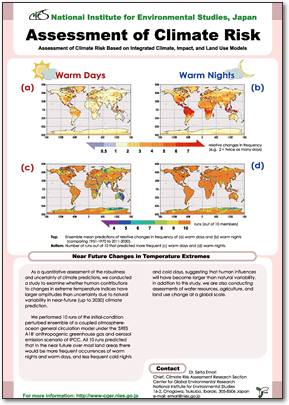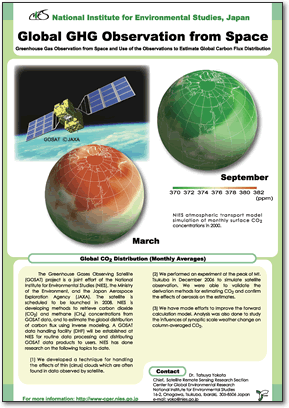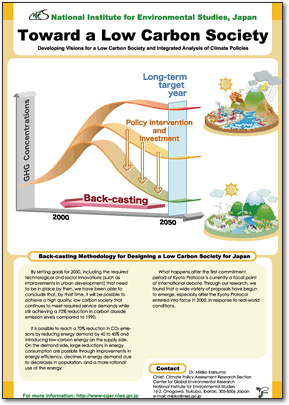The Thirteenth Conference of the Parties to the United Nations Framework Convention on Climate Change (UNFCCC) and the Third Meeting of the Parties to the Kyoto Protocol (COP13/CMP3) was held in Bali, Indonesia from December 3 to 14, 2007. The National Institute for Environmental Studies (NIES) participated in this event by hosting two side events and organizing an exhibit displaying information on climate change and relevant NIES research activities. The first side event, entitled “Carbon Management in Cities: Gaps in Policy Discussions and Scientific Understanding”, was held on December 6 and it was co-hosted by the Global Carbon Project (see below) and the Asian Institute of Technology (AIT). The second event was called “Low Carbon Asia: To be or not to be” and it was hosted in collaboration with the Ministry of the Environment on December 8.
Exhibits were set up on the upper and lower levels of the Bali International Conference Center. The NIES exhibit was located on the upper level. Unlike last year, when we were fortunate enough to be able to use two booth spaces, this year we only had a very small exhibit area due to the large number of applicants and limited floor space. However, as soon as we put up the posters and displayed our promotional materials on the counter, people started to come over to have a look. A group of people from Columbia University who had a booth close to ours came over to praise our uniformly themed posters and materials.
We were impressed with the quality of the questions from the people who visited our booth. Rather than vague questions about climate change, we received specific inquiries on topics ranging from low carbon society proposals and greenhouse gas inventories to monitoring of the oceans and the Greenhouse Gases Observing Satellite (GOSAT). We could sense that the research topics covered by NIES were at the focal point of international interest and concern.
Note: The Global Carbon Project (GCP) was established in 2001 as a major scientific program of the Earth Systems Science Partnership (ESSP). ESSP is a strategic partnership between four international research programs that focus on global environmental change: the International Geosphere-Biosphere Programme (IGBP), the International Human Dimensions Programme on Global Environmental Change (IHDP), the World Climate Research Programme (WCRP) and Diversitas. The work of the GCP encompasses both the biophysical and the human dimensions of the global carbon cycle. It uses an analytical approach that integrates natural and social sciences in order to reach its goal of contributing to a scientific understanding of the carbon cycle that can be used as a basis for carbon management policies.





